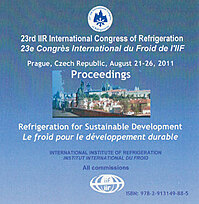
Document IIF
Plateformes frigorifiques à microfluides : forces et limites.
Microfluidic refrigeration platforms: strengths and limitations.
Numéro : pap. ID: 149
Auteurs : KOSOY B. V.
Résumé
This research attempts to sketch a road map for the next few decades in micro refrigeration development. Accomplishment of micro refrigeration systems design is strongly associated with a progress in such technologies as autonomous power supply, integrated micro transportation, and enhanced heat transfer techniques. A microfluidic refrigeration platform approach is suggested as a combinable set of refrigerant handling steps together with a suitable micro fabrication technology. It is enable the flexible and affordable implementation of the well known refrigeration principles in a potential market-relevant framework. Particular considerations are performed at reviewing prospects and constraints of recent developments in microfluidics, actuation and micro heat transfer areas with respect to their applications in development of microfluidic refrigeration platform concept. Basing on the presentation of some prominent technologies, it was concluded that beneficial microfluidic refrigeration platforms might be selected by identifying imperative requirements of a certain application, e.g. portability, low power consumption, high coefficients of performance, etc.
Documents disponibles
Format PDF
Pages : 8 p.
Disponible
Prix public
20 €
Prix membre*
Gratuit
* meilleur tarif applicable selon le type d'adhésion (voir le détail des avantages des adhésions individuelles et collectives)
Détails
- Titre original : Microfluidic refrigeration platforms: strengths and limitations.
- Identifiant de la fiche : 30001565
- Langues : Anglais
- Source : Proceedings of the 23rd IIR International Congress of Refrigeration: Prague, Czech Republic, August 21-26, 2011. Overarching theme: Refrigeration for Sustainable Development.
- Date d'édition : 21/08/2011
Liens
Voir d'autres communications du même compte rendu (569)
Voir le compte rendu de la conférence
Indexation
-
Thèmes :
Frigorigènes, frigoporteurs : généralités;
Systèmes à compression;
Compresseurs;
Evaporateurs, condenseurs et autres échangeurs thermiques;
Transfert de chaleur;
Transfert de masse - Mots-clés : Système frigorifique; Microtechnologie; Microcanal; Transfert de chaleur; Synthèse; Miniaturisation; Développement; Échangeur de chaleur
-
Quantification of refrigerant distribution and ...
- Auteurs : BOWERS C. D., WUJEK S. S., HRNJAK P. S.
- Date : 12/07/2010
- Langues : Anglais
- Formats : PDF
Voir la fiche
-
Study of alternative refrigerants for a cascade...
- Auteurs : MAYTA TITO J. M., ORTEGA SOTOMAYOR P., PARISE J. A. R.
- Date : 21/08/2011
- Langues : Anglais
- Source : Proceedings of the 23rd IIR International Congress of Refrigeration: Prague, Czech Republic, August 21-26, 2011. Overarching theme: Refrigeration for Sustainable Development.
- Formats : PDF
Voir la fiche
-
A mass flow based generalized microchannel heat...
- Auteurs : HUANG L., AUTE V., RADERMACHER R.
- Date : 25/06/2012
- Langues : Anglais
- Source : 10th IIR-Gustav Lorentzen Conference on Natural Working Fluids (GL2012). Proceedings. Delft, The Netherlands, June 25-27, 2012.
- Formats : PDF
Voir la fiche
-
Nano-powders migration and heat transfer charac...
- Auteurs : DING G. L., PENG H., HU H. T.
- Date : 21/08/2011
- Langues : Anglais
- Source : Proceedings of the 23rd IIR International Congress of Refrigeration: Prague, Czech Republic, August 21-26, 2011. Overarching theme: Refrigeration for Sustainable Development.
- Formats : PDF
Voir la fiche
-
Fin performance analysis for microchannel heat ...
- Auteurs : HUANG L., BACELLAR D., AUTE V., et al.
- Date : 14/07/2014
- Langues : Anglais
- Source : 2014 Purdue Conferences. 15th International Refrigeration and Air-Conditioning Conference at Purdue.
- Formats : PDF
Voir la fiche
